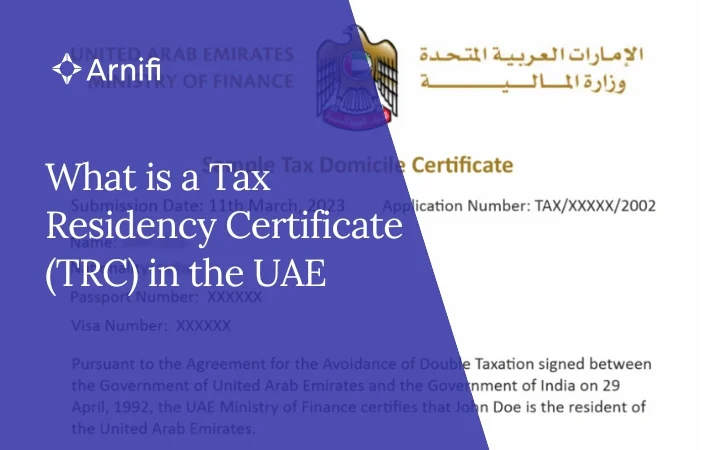UAE Corporate Tax Background and Landscape: Key Insights
by Suraj Dec 14, 2023  12 MIN READ
12 MIN READ
The UAE has been a hub for business and trade for many years. One of the reasons why it is attractive is its tax regime. The country has a relatively low tax rate, which makes it a lucrative destination for businesses looking to expand or set up shop in the Middle East. However, there are rules and regulations that businesses must comply with when it comes to corporate tax. In this blog post, we will explore the UAE corporate tax background and landscape, including pre-2018 tax scenarios and the introduction of VAT in 2018.
We’ll also take a deeper dive into understanding mainland companies and their compliance requirements. Additionally, we will discuss free-zone businesses and their implications regarding corporate tax. Finally, we will touch upon emerging trends in the UAE’s corporate tax landscape. Also, how businesses can stay competitive while complying with regulations. So, Whether you’re an existing business owner or planning to start one in the UAE, this blog post will provide key insights into navigating the country’s corporate tax landscape.
Tracing the UAE Corporate Tax Landscape
The UAE’s taxation landscape was reshaped by the introduction of corporate tax, aligning the country with international tax standards. Crucial for businesses in the UAE, the corporate tax regime is overseen by the federal tax authority. Here, Professional advice is essential for multinational corporations navigating this complex landscape. Understanding the implications of corporate tax law is particularly important for businesses in the Middle East and the Gulf Cooperation Council region.
1. The Tax Scenario Pre-2018
Before 2018, the UAE operated without a corporate tax regime, which attracted foreign investment and large companies to the region. Subsequently, the introduction of corporate tax brought about significant transformations in the UAE’s tax landscape. Thus, This shift was aimed at aligning the UAE with international tax standards and ensuring compliance with OECD base erosion principles. This is under the guidance of the Ministry of Finance and in line with the Gulf Cooperation Council framework.
2. The Advent of VAT in 2018
The implementation of VAT in 2018 brought about a significant shift in the UAE’s tax structure, diversifying the tax regime. This change placed greater emphasis on VAT compliance for businesses across the country. Thus, It also underscored the importance of understanding the indirect tax landscape for corporations operating in the UAE, aligning the country with international standards and the OECD base erosion.
Understanding UAE Mainland Companies
Mainland companies, integral to the UAE business environment, operate outside free zones, abiding by corporate tax laws. Understanding their primary characteristics is crucial for businesses navigating the UAE CT regime. These companies play a significant role in the international standards set by the Ministry of Finance, shaping the corporate income tax landscape in line with OECD base erosion norms. Their compliance and strategic tax approaches exemplify the evolving Middle East and Gulf Cooperation Council tax landscape.
1. Defining Mainland Companies
Mainland companies in the UAE are subject to the corporate tax laws and specific business activities permissible within the UAE. However, foreign ownership restrictions also apply to them. Thus, Understanding these aspects is crucial for businesses operating in the Middle East. The UAE’s Ministry of Finance aligns the corporate income tax with international standards, including those set by the OECD base erosion and profit shifting project and the Gulf Cooperation Council.
2. Primary Characteristics of Mainland Companies
In the UAE, mainland companies have the advantage of engaging in business activities across the entire country. However, their operations are significantly impacted by the regulations surrounding real estate ownership. Here, Adhering to the international standards as advocated by the Ministry of Finance is crucial for these companies, considering the dynamic corporate tax landscape in the Middle East and the Gulf Cooperation Council (GCC) region. This is how, The UAE’s corporate tax regime aligns with OECD base erosion and profit shifting principles, influencing the corporate income tax structure.
Corporate Tax Compliance: A Look at Mainland Companies
Mainland companies in the UAE are required to adhere to crucial compliance requirements including tax calculation for taxable profits and transfer pricing regulations. Understanding and following these compliance requirements is essential for corporate tax compliance in line with international standards set by organizations like the OECD. So, The Ministry of Finance in the UAE governs the corporate tax regime, ensuring that mainland companies operate within the framework of the Gulf Cooperation Council (GCC) and Middle East regulations.
1. Essential Compliance Requirements
Mainland companies in the UAE must file corporate tax returns annually, affecting their financial transactions. Failure to comply with tax laws can lead to significant financial penalties. As per international standards and OECD base erosion guidelines, the Ministry of Finance oversees the implementation of the UAE CT regime, aligning it with the Middle East and Gulf Cooperation Council tax framework. Here, Non-compliance can result in adverse impacts, making adherence to essential compliance requirements crucial for businesses operating in the UAE.
2. Penalties for Non-compliance
Non-compliance with corporate tax filing regulations may result in financial penalties, especially for mainland companies. Failure to meet tax filing deadlines can lead to severe penalties. Moreover, when companies do not comply with tax laws, it directly affects the taxable income of mainland companies, impacting their overall financial position. It is crucial for companies to adhere to international standards and the UAE CT regime to avoid penalties and maintain compliance with corporate tax laws.
Do Free Zone Businesses Fall Under Corporate Tax?
Free zone businesses in the UAE enjoy tax exemptions, setting them apart from mainland companies. Understanding the tax regime for free zone businesses is crucial for foreign investors. These zones offer corporate tax benefits, making them attractive for small businesses and investment funds.
1. Defining Free Zone Businesses
Free zone businesses in the UAE are entities located in special economic zones, offering tax exemptions and foreign ownership privileges. They benefit from 100% foreign ownership, no corporate tax, and simplified import/export procedures. These businesses are only subject to taxation if they operate outside the free zone, under the UAE’s taxation landscape. They play a crucial role in attracting foreign investment and contributing to the country’s economic diversification and growth.
2. Free Zone Businesses and Corporate Tax Implications
Operating within the free zones, businesses in the UAE typically enjoy exemption from corporate tax. However, conducting business outside the free zones brings forth corporate tax implications that align with international standards. Understanding the corporate tax law becomes crucial for free zone businesses aiming to expand outside these zones. The tax regime for such businesses aims to maintain the UAE’s global presence and attract foreign investment while requiring compliance with tax regulations
Calculating Corporate Tax for Mainland Companies
Mainland companies in the UAE calculate corporate tax based on their taxable profits, complying with federal corporate tax rates and regulations. The calculation process involves determining taxable income, considering deductions and exemptions allowed by the law. With the introduction of corporate tax, accurate calculation and reporting of tax liabilities for mainland companies are mandated. The tax authority, in line with international standards, oversees the process to ensure compliance and accuracy, making it essential for companies to understand this process.
1. The Tax Calculation Process Explained
The process of tax calculation for mainland companies in the UAE involves computing the net income, applying the federal corporate tax rate, and deducting allowable expenses. It requires meticulous record-keeping, accurate financial transactions, and compliance with transfer pricing regulations. Adhering to the tax authority’s guidelines is essential for precise tax calculation and compliance with tax laws, aligning with international standards. This process reflects the taxable profits and corporate tax liabilities, crucial for maintaining tax compliance.
2. Examples of Corporate Tax Calculation
Determining taxable profits, applying the corporate tax rate, and filing corporate tax returns are integral to mainland companies’ corporate tax calculation. These examples illustrate the impact of taxable income, tax rate, and allowable expenses on corporate tax liabilities, aiding in compliance with the UAE CT regime and international standards. Accurate calculations showcase financial implications, ensuring compliance with the Ministry of Finance regulations and OECD Base Erosion guidelines. Understanding real-life examples aids in fulfilling tax obligations and navigating the Middle East and Gulf Cooperation Council tax landscape.
The Process of Tax Filing and Registering
Mainland companies in the UAE are obligated to undergo the process of tax filing and registering, which includes submitting corporate tax returns and financial statements to the tax authority. This involves reporting taxable income, tax exemptions, and corporate tax liabilities to ensure compliance with tax laws. The tax authority oversees the entire process, verifying the accuracy of corporate tax returns and financial information, and ensuring adherence to tax compliance and regulations, along with the specified timeframe for tax calculation. Meeting these requirements is crucial for companies to avoid penalties and maintain tax compliance.
1. Timeframe for Tax Calculation
Aligning with the financial year, mainland companies assess taxable income and corporate tax liabilities annually. Understanding this timeframe enables companies to plan and prepare for tax filing and registering obligations, ensuring timely submission of corporate tax returns. Thus, Adhering to tax authority deadlines is essential for accurate determination of taxable profits and corporate tax obligations, maintaining compliance, and avoiding penalties.
2. Steps Involved in Tax Filing and Registering
Gathering financial records, preparing corporate tax returns, and submitting them to the tax authority are essential steps in tax filing and registering for UAE mainland companies. Here, Compliance with corporate tax regime rules is crucial as it involves assessing taxable income, calculating corporate tax, and disclosing financial information. Here, Understanding these steps is crucial for companies to fulfill tax obligations, maintain compliance, and contribute to the UAE’s tax landscape.
How Can Mainland Companies Stay Competitive with Corporate Tax?
To stay competitive with corporate tax, mainland companies can seek professional advice, utilize tax exemptions, and optimize their tax structure. Strategic tax planning and compliance are crucial for enhancing competitiveness, mitigating risks, and maximizing benefits. Adhering to international standards and regulations also strengthens their position. Thus, Understanding the corporate tax landscape empowers informed decision-making, fostering competitiveness in the business environment. So, Effective tax strategies facilitate growth, innovation, and sustainability in the corporate tax regime.
1. Strategic Approaches to Corporate Tax
Implementing tax-efficient structures and transfer pricing strategies enable UAE mainland companies to strategically manage corporate tax, aligning with international standards and regulations. So, This strategic approach optimizes their tax position, reduces liabilities, and fosters competitiveness in the Middle East business landscape. Here, Professional advice and expertise play a pivotal role in navigating the corporate tax regime, promoting transparency, and safeguarding financial interests, fostering long-term success in the UAE CT regime.
2. Examples of Successful Tax Strategies
Implementing transfer pricing regulations facilitates effective management of taxable profits. Thus, Adhering to international tax standards ensures compliance with global tax laws, aligning with OECD base erosion and profit shifting (BEPS) framework. So, Professional advice on UAE corporate tax from the Ministry of Finance steers companies towards greater tax compliance. This is how, Managing tax exemptions aids in minimizing corporate income tax, supporting competitiveness in the Middle East and Gulf Cooperation Council region. Thus, Understanding tax avoidance regulations is crucial to mitigate legal consequences.
Emerging Trends in UAE Corporate Tax Landscape
The UAE’s corporate tax landscape has undergone significant changes, reshaping the country’s taxation framework. With a focus on tax compliance, new corporate tax laws have been developed, aligning the region with international standards. Thus, The taxation of corporations has become integral, bringing UAE on par with global tax norms. Additionally, federal tax authority regulations have revamped corporate tax filing procedures, reflecting the Ministry of Finance’s commitment to adhering to OECD base erosion standards.
1. How will UAE’s Corporate Tax Shape the Future Business Landscape?
The introduction of corporate tax in the UAE has attracted foreign investment and influenced the business environment. So, Multinational corporations have been impacted by the new tax regime, affecting their financial transactions. So, The corporate tax landscape has also changed the tax period and calculation methods for businesses, both small and large. Thus, These changes will shape the future business landscape in the UAE.
ALSO READ: How to empower your Business Entity in UAE?
Conclusion
In conclusion, understanding the UAE corporate tax landscape is crucial for businesses operating in the region. The introduction of VAT in 2018 marked a significant shift in the tax scenario. So, Mainland companies have specific characteristics and compliance requirements that need to be met to avoid penalties. Free zone businesses, on the other hand, may have different implications when it comes to corporate tax.
Calculating and filing corporate tax can be complex, but by following the necessary steps and seeking professional advice, mainland companies can ensure compliance. It’s also important for businesses to strategize and stay competitive in the face of corporate tax. Thus, By adopting successful tax strategies, companies can navigate the ever-changing tax landscape and maintain their competitiveness.
As we look to the future, the UAE’s corporate tax policies will continue to shape the business landscape. So, staying informed about emerging trends and adapting to new regulations will be essential for businesses to thrive in this dynamic environment.
About Arnifi
Arnifi is digital first Corporate service provider helping companies enter the Middle East region, starting with UAE and Saudi Arabia markets. Founded and backed by professionals from Amazon, Souq and other large companies operating in KSA – the team understands what it takes to succeed as a startup in both UAE and Saudi Arabian markets, apart from going through the setup process multiple times.
Arnifi will provide a truly digital experience to entry and scale up of companies both UAE and Saudi Arabia. The Arnifi promise is simple, yet revolutionary, use technology and a great team to provide transparency, efficiency and great customer experience in the whole process.
Check out at – www.Arnifi.com for more details.
Read More
To help with global business expansion
make sure you choose us.
Get in touch with our team to find out about our approach
Response within 24 Hours




